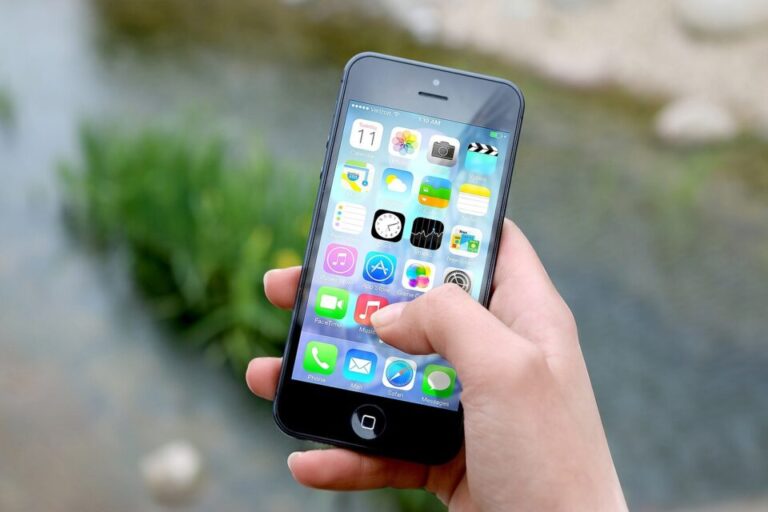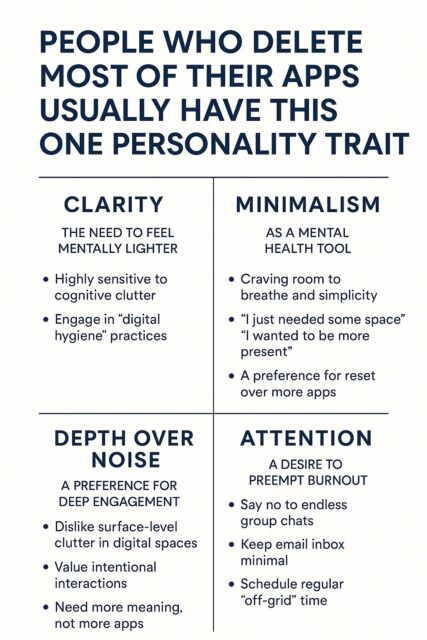A friend of mine—let’s call her Lianne—has this ritual she swears by. Every couple of months, without fail, she’ll go through her phone and delete nearly all the apps. Not just the random ones. She’ll get rid of entire social platforms, productivity tools, even fitness trackers. Her home screen ends up looking practically minimalist. One time, I asked her why she did it so often. She shrugged and said, “It just starts feeling like noise.”
That phrase stuck with me: like noise. Because if you’ve ever done this—cleared your phone down to the essentials—you probably weren’t just reorganizing. You were making a statement. And more often than not, people who engage in this kind of digital reset over and over again have one strong personality trait in common:
They crave clarity.
But this clarity doesn’t just show up in how they manage their phone screen. It runs much deeper, influencing how they approach decisions, relationships, productivity, and even self-worth.
Let’s break that down.
The need to feel mentally lighter
We’re all carrying a mental load. The endless notifications, half-baked to-do lists, unread messages, and that sneaky habit of checking apps just to scroll… it piles up. And even if we don’t realize it consciously, our brains are doing the heavy lifting behind the scenes.
People who routinely delete their apps tend to be highly sensitive to this cognitive clutter. They’re often the ones who get overwhelmed not by major life events—but by the low-grade hum of distraction that never really stops. So instead of waiting for burnout to hit, they act early.
This is a trait of people with high self-awareness.
It seems like being more introspective helps one engage better with digital hygiene practices. You get to deliberately limit screen time, turn off notifications, or yes, delete apps entirely. You do it because you want to use tech intentionally.
Minimalism as a mental health tool
This kind of behavior often overlaps with what we now call “intentional minimalism.” But for many who practice it, it’s not really about aesthetic—it’s psychological.
Deleting apps becomes a kind of self-therapy. It’s a way to reclaim agency in a world that constantly pulls for your attention.
These individuals often say things like:
- “I just needed some space.”
- “I wanted to be more present.”
- “It was starting to mess with my focus.”
You hear that, and you know this isn’t about just a cleaner screen. It’s about a deeper reset. A craving for simplicity, for room to breathe. And let’s be honest, that’s not just a digital problem. That’s a life problem.
A preference for depth over noise
In psychology, there’s a personality trait known as high openness to experience, especially the aesthetic sensitivity and reflective aspects. People high in this trait often seek meaningful engagement and are repelled by surface-level clutter—be it in their environment, conversations, or even digital spaces.
They don’t want five weather apps, seven goal-setting tools, and a dozen half-used group chats. They want the one thing that works, and they want to do it well.
While researching for this blog, I started coming to a conclusion that people who frequently “prune” their app usage are also more likely to value privacy, introspection, and time offline. Not because they’re antisocial—but because they want more intentional interactions. They need more meaning to life.
When I wiped my screen clean
I did it once. Deleted nearly everything. I was knee-deep in a chaotic month—deadlines everywhere, friends trying to plan a group trip, a million Slack pings a day. And somewhere in the middle of that, I realized I hadn’t had a quiet thought in weeks.
So, I deleted Instagram. I signed out of Gmail. I even ditched my podcast app. What surprised me was not how much calmer I felt—it was how quickly I missed that calm once I reinstalled everything a week later.
That was the moment I realized: I wasn’t addicted to the apps. I was addicted to escaping from myself. And deleting them forced me to sit with that.
People who do this regularly—this digital cleanse? They’re often not running from anything. Quite the opposite. They’re returning to themselves. Over and over again.
But isn’t this just digital burnout?
Sometimes, yes. But there’s a difference between reacting to digital overload and proactively managing it.
People with the clarity trait don’t just respond to burnout—they preempt it.
They’re the ones who:
- Say no to group chats that spiral out of control.
- Keep their email inbox under 50.
- Use just one productivity app, not seven.
- Regularly schedule “off-grid” weekends.
This kind of behavior might seem extreme if you’re used to constant connection. But for them, it’s normal. It’s how they stay sane in a world that profits from their distraction.
What this really says about them
At the heart of it, people who delete most of their apps every few months are usually saying one quiet thing to themselves:
“I want my attention back.”
They’ve realized that energy follows attention. And when too much of it is scattered across notifications, messages, and mindless scrolling, it leaves nothing behind for the things that really matter—relationships, creativity, joy, presence.
In many ways, it’s a quiet rebellion. A refusal to let algorithms dictate the rhythm of their lives.
And that, to me, is not just clarity. It’s courage.
Final thought
So if you’re one of those people who does this—who deletes and resets and simplifies your digital world every few months—don’t let anyone make you feel weird for it.
You’re not flaky. You’re not indecisive.
You’re someone who listens to yourself. Someone who senses when it’s time to start over. Someone who knows that sometimes, the best way to move forward… is to clear some space first.

